The Coaching Habit – Michael Bungay Stanier | Productivity Game
Reference: Productivity Game. (2018, November 18). THE COACHING HABIT by Michael Bungay Stanier | Core Message [Video]. YouTube.
We Make Your Education Count

Get the Credit You Deserve and Become the Most Attractive Job Candidate by Earning and Posting A+ Badges to Your Linkedin Profile.
Sign Up to Get Started at Accredicity
Unlock your inner coach with Michael Bungay Stanier's 4 powerful questions to help your friends, family & employees find their way out of stressful situations.The Coaching Habit by Michael Bungay Stanier is a great resource for leaders and coaches. In the book, Stanier proposes that when someone is in a stressful situation and turns to you for help, it is better to ask questions rather than offer advice. He outlines four key questions to help people focus on what matters: what's on your mind, what else, what's the real challenge here for you, and if you're saying yes to this, what are you saying no to? These questions help create more wisdom, insights, and self-awareness. They also help people strategically free up time and energy to focus on what matters most. Learning Outline1. Ask 'What's on your mind?' to skip the small talk and get to what matters. Instructional ContentThe Coaching Habit by Michael Bungay Stanier is a powerful tool for anyone who wants to become a better communicator, leader, and coach. In this video, Stanier shares four essential questions you can use to help people in stressful situations: “What’s on your mind?”, “What else?”, “What’s the real challenge here for you?”, and “If you’re saying yes to this, what are you saying no to?”. Stanier explains that the first question, “What’s on your mind?”, is important because it encourages the person you’re coaching to skip the small talk and get to the root of the issue. He says that asking “what else?” helps to create more self-awareness and wisdom. The third question, “What’s the real challenge here for you?”, helps the person you’re coaching to focus on the most important problem. Finally, Stanier explains that the last question, “If you’re saying yes to this, what are you saying no to?”, helps them develop a strategy and commit to making progress. The Coaching Habit is an invaluable resource for anyone looking to become a better coach, leader, or communicator. By asking these four questions, you can help someone in a stressful situation to focus on the most important challenges, create more self-awareness, and develop a strategy for overcoming those challenges. If you’re looking for a way to become a better coach, leader, or communicator, then The Coaching Habit by Michael Bungay Stanier is a must-read. Leadership
|

The Coaching Habit by Michael Bungay Stanier is a great book that tells us how to help our friends, teammates, or employees who come to us for help and are feeling stressed. Instead of giving them advice, Stanier suggests we ask them four questions: "What's on your mind?", "What else?", "What's the real challenge here for you?", and "If you're saying yes to this, what are you saying no to?". These questions help people to dig deep and figure out how to solve their problems and free up their time and energy. So, next time you're trying to help someone out, don't give them advice - ask them questions instead! Video Quotes1. "Rather than talk about the weather or how their sports team is doing and any other superficial boring and simply useless chitchat get to what matters." (Michael Bungay Stanier) 2. "Asking what else creates more wisdom more insights and more self-awareness than any other question." (Michael Bungay Stanier) 3. "The change of behavior at the heart of what this book is about is this a little more asking people questions and a little less telling people what to do." (Michael Bungay Stanier) Related Quotes"It's really a mindset, it's a way of being and of working, it's a set of habits that you build that allow you to become a better coach." -Michael Bungay Stanier "Less advice and more asking." -Michael Bungay Stanier "The most powerful questions are the ones that you don't have the answer to." -Michael Bungay Stanier Competencies1. Coaching Learning Outcomes1. Comprehend: Understand the core message of the book "The Coaching Habit" by Michael Bungay Stanier and its implications for becoming a great leader and coach. 2. Apply: Utilize the four questions in the book to help coach oneself or others through stressful situations. 3. Analyze: Identify and distinguish the difference between superficially addressing the issue and getting to what matters. 4. Evaluate: Assess the pros and cons of providing advice versus asking questions to help others gain clarity and insight. 5. Create: Develop a strategy to overcome challenges by saying "yes" or "no" to certain tasks and activities. 6. Synthesize: Put together the key elements of the book to practice a habit of questioning and less telling to become an effective leader and coach. Sample Answers1. I learned that advice is not as effective as asking questions to help someone in a stressful situation. Michael Bungay Stanier suggests four excellent questions to do so which are: What's on your mind?, What else?, What's the real challenge here for you?, and If you're saying yes to this, what are you saying no to? 2. The book also teaches that using the word “you” in the questions helps the person being coached to come to a solution faster and more accurately. Additionally, it encourages people to focus on what matters most and commit to making progress. 3. Lastly, I learned that saying yes to overcoming a real challenge requires more time and energy than we may think. Therefore, it is important to help the person being coached to strategically free up time and energy to focus on what is most important. Michael Bungay StanierMichael Bungay Stanier is a Rhodes Scholar and the Senior Partner at Box of Crayons, a leadership development company. He is the author of the best-selling book The Coaching Habit: Say Less, Ask More & Change the Way You Lead Forever. He has dedicated his career to helping organizations make coaching a part of their everyday leadership practice. He is a master certified coach, a Fellow of the International Coaching Federation and an advocate of the coaching profession. He is also the creator of several coaching tools and resources such as The Coaching Habit App, The Ready-to-Lead Toolkit, and The Coaching Kata. Michael Bungay Stanier Learning DesignThese three competencies are important for the course on Leadership because they are essential skills for effective leadership. Coaching is an important leadership skill because it helps to develop the skills of team members, giving them the support and guidance needed to reach their goals. Emotional intelligence is also important for leaders because it allows them to understand the emotions of their team and make decisions based on that understanding. Finally, professional relationships are important for successful leadership because they help to build trust and respect between leader and team members. AssessmentQ: According to Michael Bungay Stanier, what is the key to being a great coach? A. Spend more time telling someone what to do Answer: C. Ask good questions QuestionsQuestions for Students: Questions for Real-Life Examples and Scenarios: KeywordsCoaching Habit, World Renowned Performance Coach, Stressful Situation, Real Challenge, Saying Yes, Saying No Facts1. The four excellent questions in The Coaching Habit are designed to help people find a way out of overwhelming stress. Trends1. Create an online coaching course based on the four questions in the Coaching Habit. The course would include an in-depth look at how to ask the questions and how to apply them to various situations. 2. Create a series of webinars focused on the concept of saying 'no' in order to make space for more meaningful commitments. 3. Develop a coaching program that helps individuals identify their real challenges and develop a strategy to overcome them. SourceThis learning instructional guidance was formulated using the GPT-3 language model created by OpenAI. ShareWant to become a better leader and coach? Try reading #TheCoachingHabit by Michael Bungay Stanier and learn 4 excellent questions you can use to help your friends, teammates, and employees find a way out of overwhelming and stressful situations. 🤔 #Leadership #Coaching #Help @Accredicity |








 8 Creds - Leadership
8 Creds - Leadership



